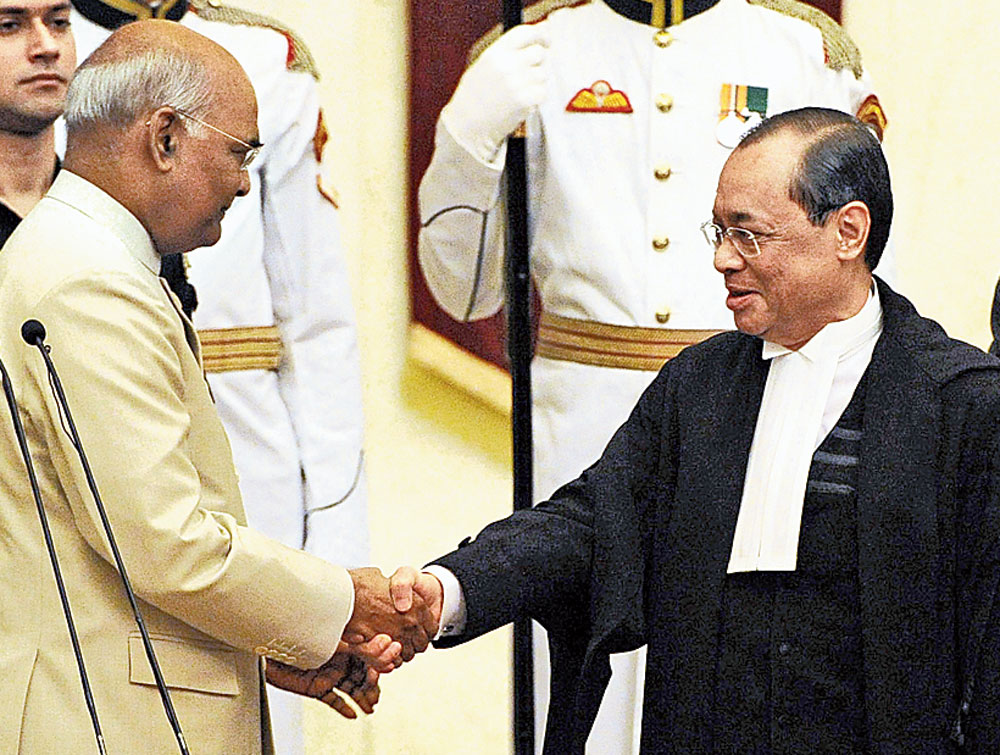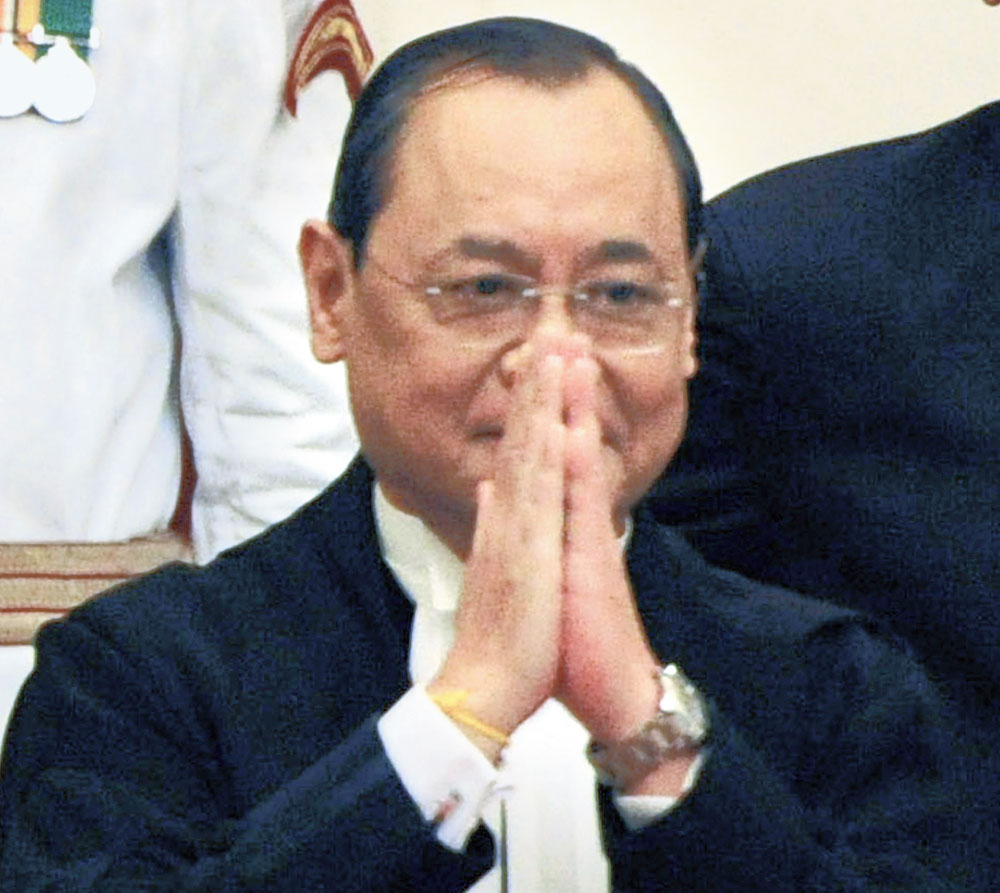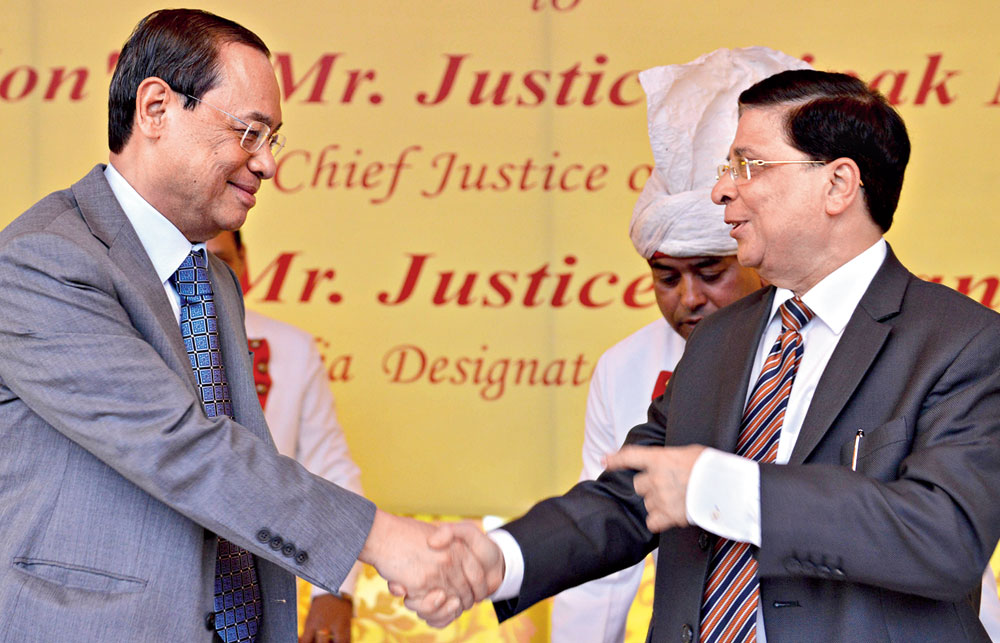Immediately after being sworn in on Wednesday, Chief Justice of India Ranjan Gogoi stopped the age-old practice of “oral mentioning” of unlisted issues for “urgent” hearing, saying he would agree only if someone is being “killed”, “hanged” or “evicted”.
“If somebody is going to be killed, evicted or hanged today, only such cases will be entertained to list them urgently,” Justice Gogoi told the packed hall, sitting on a bench with Justices Sanjay Kishan Kaul and K.M. Joseph.
Later, at a felicitation for him in the evening, Justice Gogoi said merely increasing the salaries of judges manifold or raising their retirement age would not ensure the independence of the institution, unless the judges preserve the aura and dignity of their posts.
Referring to criticism that he is very strict in court, the 46th Chief Justice of India said: “I am a strict man, I am what I am, I can’t change.”
“Oral mentioning” is the practice of advocates in the Supreme Court seeking early listing of their cases citing “urgency”. It is done only in the Chief Justice’s court where the advocates make an oral plea and the bench passes orders for early listing.
The practice is like a double-edged weapon, where at times important cases find early listing but at other times relatively unimportant matters jump the queue, causing heartburn within the Bar.
Technically and conventionally, only matters registered and listed by the registry ought to be taken up for hearing. But over the years, the Supreme Court and high courts had adopted the practice of “oral mentioning” of cases for early listing.
Justice Gogoi had driven to the court from Rashtrapati Bhavan where he was sworn in by President Ram Nath Kovind.
The new Chief Justice began hearings at noon and gave a taste of his business-like approach to advocate Mathews J. Nedumpura, who had congratulated him with a welcome address.
“This is not required, Mr Nedumpura. Let’s first get to work. All these things are not required,” Justice Gogoi said, cutting him short.
“You want to mention something? Don’t do it,” the Chief Justice brusquely told Nedumpura.
The advocate persisted, saying: “My Lord, I have come all the way from Kochi.” But Justice Gogoi said: “You may come from anywhere, we are not bothered.”
Next was the turn of prominent advocate Prashant Bhushan, who sought early listing of an application moved by him on behalf of five Rohingya Muslims who he pleaded were being deported by the Centre.
The Chief Justice said he would not entertain any oral mentioning and asked Bhushan to file his application so that it could be examined in the normal course.
“We are working out some parameters on dealing with mentioning matters in another two days,” Justice Gogoi told the advocates.
The top judge also made it clear that the common practice of “passover” pleas made by junior advocates on behalf of their seniors must stop.
He told a lady advocate who had sought a “passover” to argue the case herself, instead of waiting for her senior. Her matter was later adjourned.
It is a common practice, when a matter is called up for hearing, for junior advocates to seek “passover” — a form of temporary adjournment — as the senior lawyer is busy in some other court. This results in considerable loss of court time.
At an event last week, Justice Gogoi had said he would soon unveil a plan of action to bring down the pendency of cases throughout the country.
On Wednesday evening, at a felicitation organised for him by the Supreme Court Bar Association, Justice Gogoi said raising the retirement age of judges or their salaries would not solve the problems confronting the judiciary unless judges maintain the “aura” and “dignity” of their office.
“Increase the age to whatever you want, give as much money as you want to the judges by way of salaries. I don’t think unless other issues are tackled and this issue is the aura and dignity of the institution… we may raise it to 70 (age), we may raise it to Rs 20 lakh (per month salary), it is not going to work,” Justice Gogoi said.
The Chief Justice made the observation in response to attorney-general K.K. Venugopal’s plea in his address that the government must raise the retirement age of Supreme Court and high court judges to 70 years. Apex court judges retire at 65 and high court judges at 62. Venugopal also pitched for a three-to-four-fold pay hike for the judges whose salaries range from Rs 1.5 lakh to Rs 2.5 lakh. These would help ensure independence of the judiciary, Venugopal said.
Justice Gogoi promised a system that would work better, adding he and his colleagues had been working on it for “quite some time” and he expected it to be ready in a few days. “We are trying to reduce the time between filing of cases and listing of cases on board,” he said.
The Chief Justice said his top priority would be to fill up the 5,000-odd vacancies in various trial courts of the country and the results would be visible in three-four months.
“Filling up of vacancies is not going to solve the problem. It is a solution but not the whole solution, the solution lies in getting the right man and the right man will come only when the office maintains its aura and dignity,” said Justice Gogoi, the first judge from the Northeast to rise to be the Chief Justice. His father Keshab Chandra Gogoi had served as chief minister of Assam in 1982.













